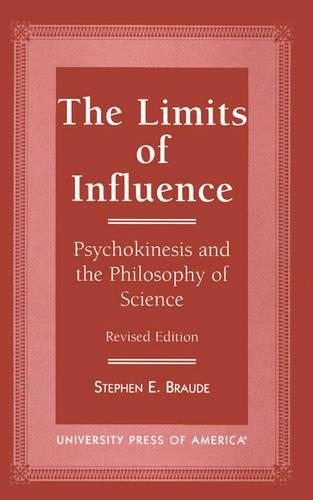
The Limits of Influence: Psychokinesis and the Philosophy of Science
(Paperback)
Publishing Details
The Limits of Influence: Psychokinesis and the Philosophy of Science
By (Author) Stephen E. Braude
University Press of America
University Press of America
26th December 1996
United States
Classifications
General
Non Fiction
Science: general issues
133.88
Physical Properties
Paperback
328
Width 138mm, Height 215mm, Spine 24mm
417g
Description
The Limits of Influence is a detailed examination and defense of the evidence for largescale-psychokinesis (PK). It examines the reasons why experimental evidence has not, and perhaps cannot, convince most skeptics that PK is genuine, and it considers why traditional experimental procedures are important to reveal interesting facts about the phenomena. It then examines why PK does not pose a clear threat to the very fabric of science, as many have proposed. The major skeptical challenges to taking large-scale PK seriously and the reason why those challenges are all unsatisfactory are considered. The evidence examined most closely is the turn-of-the-century evidence for physical mediumship, with special attention given to the cases of D.D. Home and Eusapio Palladino. The author compares and evaluates the leading theories of apparitions and considers the extent to which the evidence for collective apparitions can be interpreted as a further type of psychokinetic phenomenon. Finally, the claim that PK (and psychic functioning generally) might occur in refined and extensive forms is considered. It argues that this claim is not as outlandish as many have maintained and that we might have to accept something like the 'magical' world view associated with so-called 'primitive' societies.
Reviews
Praise for the Original Edition: I'm delighted to see it in print. Braude is surely one of the best-informed and most readable philosophical guides, and his book offers the most orderly entry into the inevitable quarrels. The anecdotal material is absolutely fascinating. But Braude's careful speculation about its bearing on causality and empirical confirmation are even more intriguing and much more important. -- Joseph Margolis, Temple University * Choice Reviews *
Rigorous and well writtenhighly recommended. -- Joseph Margolis, Temple University * The Scientific and Medical Network Review *
...this work is the only comparable work of sophisticated philosophical analysis. Fine scholarship on the reports of mediums and apparitions is combined with careful philosophical reasoning...The subject itself, with lively discussion of historical examples, will appeal to a wide audience. The careful argumentation should especially provoke philosophers and parapsychologists. Recommended for college and university collections. * Choice Reviews *
...this work is the only comparable work of sophisticated philosophical analysis. Fine scholarship on the reports of mediums and apparitions is combined with careful philosophical reasoning...The subject itself, with lively discussion of historical examples, will appeal to a wide audience. The careful argumentation should especially provoke philosophers and parapsychologists. Recommended for college and university collections. * Choice Reviews *
Praise for the Original Edition: I'm delighted to see it in print. Braude is surely one of the best-informed and most readable philosophical guides, and his book offers the most orderly entry into the inevitable quarrels. The anecdotal material is absolutely fascinating. But Braude's careful speculation about its bearing on causality and empirical confirmation are even more intriguing and much more important. -- Joseph Margolis, Temple University * Choice Reviews *
Rigorous and well writtenhighly recommended. -- Joseph Margolis, Temple University * The Scientific and Medical Network Review *
Author Bio
Stephen E. Braude is Professor of Philosophy at the University of Maryland in Baltimore. He is also the author of First Person Plural: Multiple Personality and the Philosophy of Mind, Revised Edition (Rowman & Littlefield, 1995).
